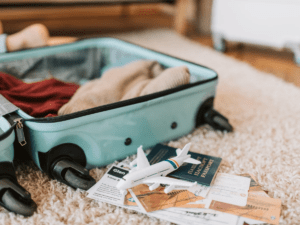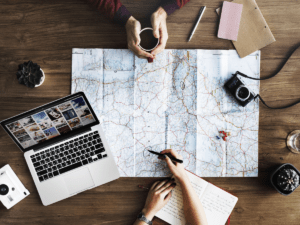Your travels have taken you to far-off lands, introduced you to new cultures, and filled your memory bank with unforgettable moments. But the journey doesn’t truly end when you return home. Post-travel reflection and planning are vital steps that allow you to maximize the impact of your experiences and ensure they continue to enrich your life. In this article, we’ll explore how to make the most of your travel adventures after the return home.
Editorial Note: We earn a commission from partner links on the Money Unscripted blog. Commissions do not affect our editors' opinions or evaluations.
The Value of Post-Travel Reflection
Reflection is a powerful tool for personal growth and learning. It allows you to:
- Internalize Your Experiences: Reflecting on your travels helps you process the emotions and lessons gained from your adventures.
- Preserve Memories: Writing about your experiences, creating scrapbooks, or organizing photos can help preserve your travel memories.
- Share Stories: Sharing your travel stories with friends and family allows you to relive your experiences and inspire others to explore the world.
- Learn from Your Experiences: By analyzing your travels, you can identify what worked well, what could have been improved, and how to plan better for future trips.
Ways to Reflect on Your Travel Experiences:
- Keep a Travel Journal: Write daily entries during your trip to capture your thoughts, feelings, and observations. After your return, reread your journal to relive your adventures.
- Create a Photo Album or Blog: Compile your favorite travel photos into an album or create a travel blog to share your journey with others.
- Review Your Itinerary: Go over your itinerary and recall the highlights of your trip. Consider what surprised you or exceeded your expectations.
- Connect with Fellow Travelers: Share stories and reflections with fellow travelers you met along the way. They may offer different perspectives on shared experiences.
- Identify Personal Growth: Reflect on how your travels have influenced you personally, emotionally, and intellectually. Have your perspectives on life, culture, or the world changed?
Planning for Future Adventures
Your reflections can serve as a valuable foundation for planning future trips. Here’s how to channel your post-travel reflections into your next adventure:
- Set New Goals: What do you want to achieve in your future travels? It could be exploring new cultures, embarking on challenging adventures, or simply relaxing and unwinding.
- Learn from Past Mistakes: Consider what could have gone better during your previous trips and use those lessons to improve your future travel plans.
- Choose New Destinations: Based on your reflections, select destinations that align with your interests and goals. Seek out places that offer the experiences you’re looking for.
- Engage in Responsible Travel: If your travels have heightened your awareness of environmental or social issues, consider how you can travel more responsibly in the future. Support eco-friendly accommodations, minimize your environmental impact, and respect local cultures.
- Budget and Save: Reflect on your spending habits during your travels and set a budget for your future adventures. Determine how much you need to save to achieve your travel goals.
- Plan Your Itinerary: Research and plan your itinerary carefully, taking into account what you learned from your past travel experiences. Ensure a balanced mix of relaxation and exploration.
- Engage with Local Communities: If connecting with local communities was a highlight of your travels, make it a priority in your future trips. Seek opportunities for meaningful interactions.
- Stay Open to New Experiences: While planning, leave room for spontaneity and unexpected discoveries. Sometimes, the best experiences are the ones you didn’t plan.
Bottom Line
Travel is a transformative journey that extends beyond the time spent on the road. Post-travel reflection and planning allow you to continue reaping the rewards of your adventures long after you return home. By preserving memories, sharing stories, and using your experiences to shape future travel, you can ensure that each trip enriches your life and broadens your horizons. So, take the time to reflect, set new goals, and get ready for the next chapter of your travel adventures












